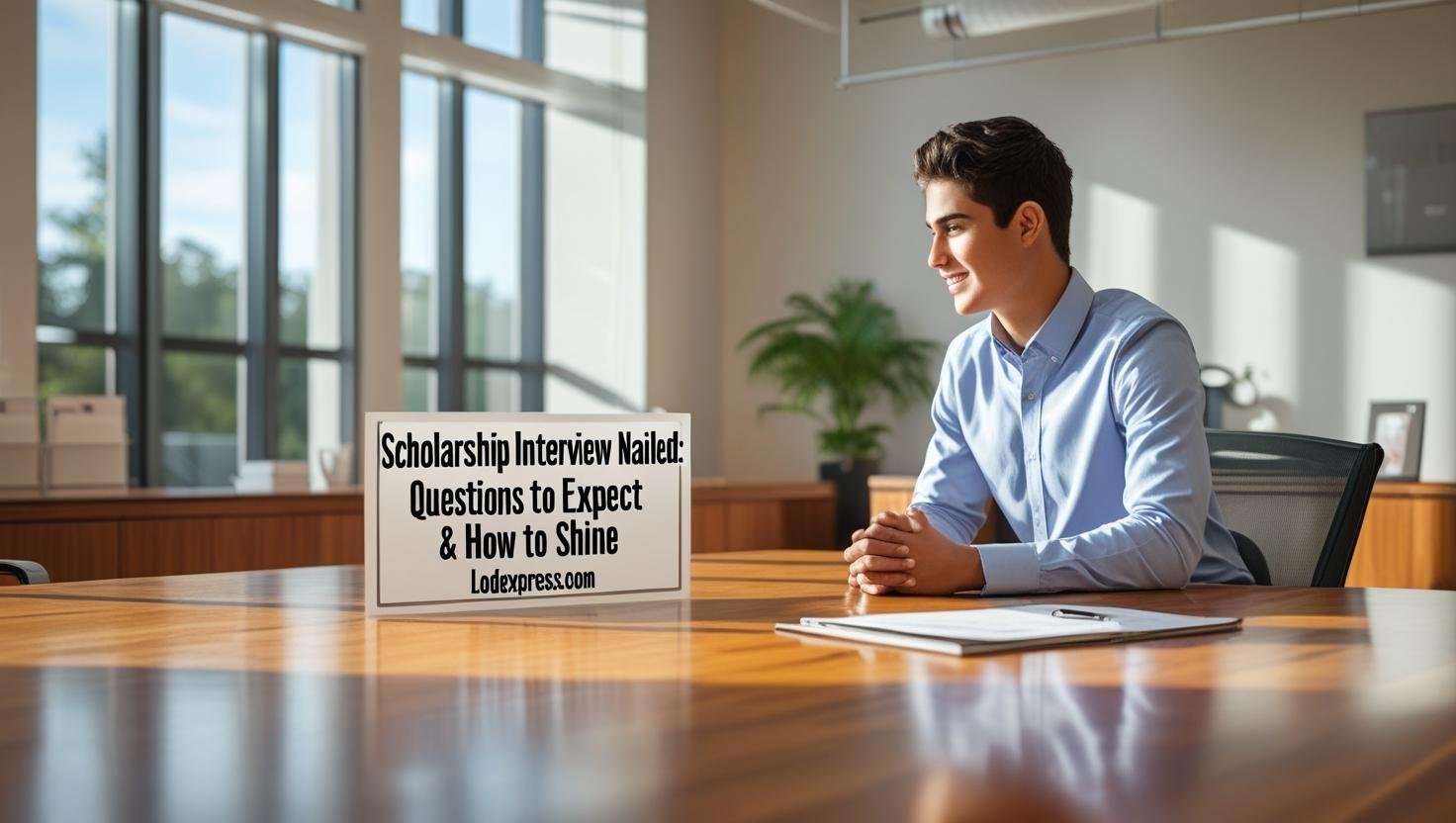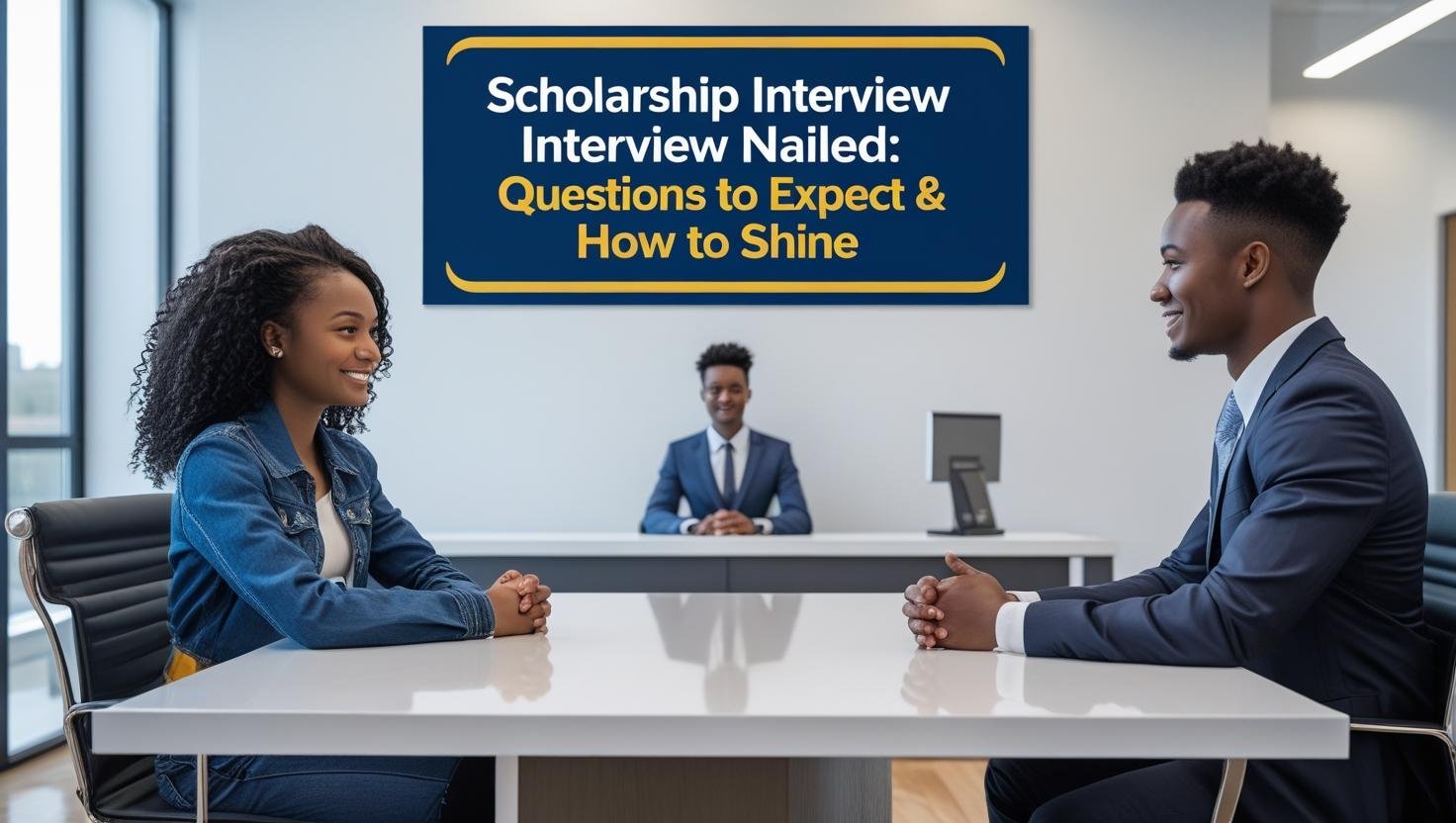Scholarship Interview Nailed: Questions to Expect & How to Shine
Key Takeaways
- Practice common interview questions to get comfortable with your answers.
- Think about your personal story and what makes you unique before the interview.
- Dress in semi-formal clothes to show you’re serious and ready.
- Ask the interviewers questions to show you’re really interested.
- Remember to say thank you after the interview to leave a good last impression.
How to Prepare for the Interview On Your Own
Okay, so you’ve got a scholarship interview coming up? Awesome! The first step is prepping solo. Think of it as laying the groundwork before you bring in the big guns (aka practice interviews).
Understanding Common Interview Questions
First things first, you gotta know what’s coming. Most scholarship interviews aren’t trying to trick you; they just want to get to know you better. Think back to the application questions – those are gold. “What are your strengths and weaknesses?” and “Who has been a role model for you?” are classics for a reason. Spend some time really thinking about your answers. Don’t just pull something out of thin air. Be honest, be thoughtful, and be specific. It’s way better to have a well-thought-out answer ready to go than to stumble through something on the spot.
Crafting Your Personal Narrative
This is where you get to tell your story. What makes you, you? What experiences have shaped you? What are you passionate about? Scholarship committees aren’t just looking for good grades; they’re looking for well-rounded individuals with a clear sense of purpose.
Think about key moments in your life challenges you’ve overcome, goals you’re working towards, and values that guide you. Weave these into a compelling narrative that showcases who you are and what you’re capable of.
Highlighting Your Unique Qualities
What makes you stand out from the crowd? Seriously, think about it. Everyone applying for this scholarship is probably smart and driven. What’s your edge? Maybe you’re an amazing artist, a coding whiz, or a community volunteer. Whatever it is, make sure you highlight it. Don’t be afraid to brag a little (but not too much!). Back up your claims with specific examples. Show, don’t just tell.
Remember, this is your chance to shine. Take the time to really reflect on your experiences, your goals, and your values. The more prepared you are, the more confident you’ll feel during the interview. And confidence is key!
How to Prepare for the Interview with a Practice Interview
Okay, so you’ve prepped your answers and picked out your outfit. Now what? Time to put it all into action with a practice interview! Seriously, don’t skip this step. It’s like rehearsing for a play you wouldn’t go on stage without running through your lines, right?
Simulating the Interview Experience
Find someone a friend, family member, teacher who’s willing to play the role of the interviewer. The more realistic you can make it, the better. Have them sit across from you, ask questions from a prepared list (or even better, a mix of prepared and unexpected questions), and take notes on your performance. Treat it like the real deal. This is your chance to get comfortable with the format and work out any jitters. You can even do a mock interview over video call to prepare for college in a professional setting.
Refining Your Responses
This is where you really dig into the details. After each practice interview, take some time to analyze your answers. Were you clear and concise? Did you answer the question fully? Did you ramble? Identify areas where you can improve your responses. Maybe you need to add more specific examples, or maybe you need to cut out unnecessary fluff. The goal is to make your answers as impactful as possible.
Seeking Feedback from Mentors
Don’t just rely on your own assessment. Ask your practice interviewer for honest feedback. What did they think of your answers? How was your body language? Did you seem confident and enthusiastic? If possible, get feedback from multiple people, especially someone who has experience with scholarship interviews or who works in your field of interest. Mentors can provide invaluable insights and help you fine-tune your approach.
Getting feedback can be tough, but it’s essential for growth. Try to approach it with an open mind and a willingness to learn. Remember, the goal is to improve your chances of landing that scholarship, and constructive criticism can help you get there.
Here’s a simple table to track feedback:
| Area of Improvement | Feedback Received | Action Plan |
|---|---|---|
| Clarity of Answers | ||
| Body Language | ||
| Enthusiasm |
How to Dress Appropriately for Your Interview
It’s super important to think about what you’re going to wear to your scholarship interview. It shows you’re serious and respect the opportunity. You don’t want your clothes to distract from what you’re saying, so let’s break down how to nail the attire.
Selecting Semi-Formal Attire
Aim for something semi-formal. Think business casual. For guys, this could mean a button-down shirt with neutral-colored pants. A tie isn’t always needed, but it can add a nice touch. For women, a blouse with a skirt (knee-length is good) or pants works well. A simple dress is also a solid choice. The goal is to look put-together without being too stuffy.
Avoiding Distracting Elements
Keep it simple. Avoid anything too flashy or distracting. Big, dangly earrings, loud patterns, or anything too revealing should be avoided. You want the focus to be on you and your qualifications, not your outfit. Make sure your clothes are clean, ironed, and fit well.
Projecting Professionalism
Your clothes are just one part of projecting professionalism. Good grooming is also key. Make sure your hair is neat, and your shoes are clean. Pay attention to the small details. It shows you care and are taking the interview seriously. A polished appearance can really make a difference.
Dressing well isn’t just about looking good; it’s about showing respect for the opportunity and the people interviewing you. It communicates that you’re serious and prepared, which can give you a real edge.
How Do You Stand Out in a Scholarship Interview?
Okay, so you’ve made it to the interview stage – awesome! But now comes the real challenge: how do you make them remember you? It’s not just about having good grades; it’s about showing them who you are and why you deserve that scholarship. Let’s break down how to really shine.
Answering Questions with Depth
Don’t just give surface-level answers. Dig deep and provide detailed responses. Think of it as telling a story, not just reciting facts. For example, if they ask about a challenge you’ve overcome, don’t just say what the challenge was. Explain how you approached it, what you learned, and how it changed you. Take your time and maintain eye contact; it shows you’re engaged and thoughtful. This is where you can really highlight your individual achievements.
Showcasing Your Personality
Let your personality shine! Scholarship committees aren’t just looking for robots with perfect GPAs. They want to know who you are as a person. Talk about your passions, your interests, and what makes you tick. Don’t be afraid to be yourself and let your enthusiasm show. They want to see that their money is going to a well-rounded person who will make a difference. It’s about showing them, “Hey, I’m not just a student; I’m a person with dreams and goals!”
Connecting with the Organization’s Mission
Do your homework! Before the interview, research the organization offering the scholarship. What are their values? What’s their mission? Find ways to connect your own goals and experiences to what they stand for.

If you can show them that you’re not just looking for money, but that you genuinely believe in what they’re doing, you’ll make a lasting impression. It shows you’re not just in it for yourself; you care about something bigger. Mentioning the organization’s mission shows you’ve done your research and are genuinely interested.
Think of the interview as a conversation, not an interrogation. Be prepared, be yourself, and let your passion shine through. They want to get to know you, so don’t be afraid to show them who you really are.
Asking Thoughtful Questions to Interviewers
It’s not just about answering questions; it’s also about showing your engagement by asking them. This part of the interview is your chance to turn the tables and demonstrate your genuine interest in the scholarship and the organization behind it. Don’t waste this opportunity with generic queries. Instead, prepare questions that show you’ve done your homework and are thinking critically about the opportunity.
Inquiring About Ideal Candidate Characteristics
Asking about the qualities and attributes the organization seeks in its ideal candidate shows you’re keen to understand their values and how you can align with them. This demonstrates a proactive approach to fitting in and contributing effectively. It’s a subtle way of reinforcing that you possess those very qualities. For example, you could ask, “Beyond academic achievements, what characteristics do you find most valuable in scholarship recipients?”
Exploring Future Opportunities
Expressing interest in the potential pathways and experiences that the scholarship could unlock demonstrates forward-thinking and ambition. It shows you’re not just looking for financial assistance but also for a chance to grow and develop. Inquire about opportunities for mentorship, networking, or further involvement with the organization. This shows you’re thinking long-term. You might ask, “Are there opportunities for scholarship recipients to engage in research or internships related to the organization’s work?”
Demonstrating Genuine Interest
Your questions should reflect a real curiosity about the organization’s mission, values, and impact. Avoid questions that can be easily answered by a quick search online. Instead, delve deeper into their work and ask about specific initiatives or challenges they’re currently addressing. This shows you’ve taken the time to understand their work and are genuinely interested in being a part of it. Consider asking, “What are some of the biggest challenges the organization faces in achieving its mission, and how do scholarship recipients contribute to overcoming them?” Remember to prepare for scholarship interview questions to make sure you are ready for anything.
Mastering Non-Verbal Communication
 Non-verbal communication is super important during your scholarship interview. It’s not just about what you say, but how you say it. Your body language can speak volumes, sometimes even more than your words. It can show confidence, interest, and respect, or the opposite if you’re not careful.
Non-verbal communication is super important during your scholarship interview. It’s not just about what you say, but how you say it. Your body language can speak volumes, sometimes even more than your words. It can show confidence, interest, and respect, or the opposite if you’re not careful.
Maintaining Eye Contact
Eye contact is key to showing you’re engaged and confident. Don’t stare intensely, but make sure you’re looking at the interviewer(s) for a good portion of the time. It shows you’re listening and that you’re being honest. Think of it as a way to connect with them on a personal level. If you’re in a group interview, try to make eye contact with each interviewer as you speak.
Practicing Good Posture
Good posture communicates confidence and respect. Sit up straight, but don’t be stiff. Relax your shoulders and keep your head up. Avoid slouching or fidgeting, as it can make you look uninterested or nervous. posture and gestures are important.
Delivering a Firm Handshake
A handshake is often the first physical contact you’ll have with the interviewer, so make it count. A firm handshake shows confidence and professionalism. Not too strong, not too weak – just right. Make sure your palms are dry, and maintain eye contact while shaking hands.
Non-verbal cues are powerful. They can reinforce your message and make you more memorable. Pay attention to your body language and practice projecting confidence and enthusiasm. It can make a big difference in how you’re perceived.
Here’s a quick guide:
- Smile genuinely
- Nod to show you’re listening
- Avoid crossing your arms
Making a Lasting Impression
Expressing Gratitude Post-Interview

Sending a thank-you note after your scholarship interview is more than just good manners; it’s a strategic move. It reinforces your interest and demonstrates professionalism. A prompt email, sent within 24 hours, is perfectly acceptable. Make it personal by referencing something specific you discussed during the interview. This shows you were engaged and paying attention. Don’t just send a generic ‘thank you’; make it count.
Following Up Thoughtfully
Following up after the interview shows you’re proactive and genuinely interested. But there’s a fine line between showing enthusiasm and being a pest. Patience is key here. If the interviewers gave you a timeline for their decision, respect it. If not, wait about a week or two after the expected decision date before sending a brief, polite email. Reiterate your interest and ask if there’s any additional information they need.
Remember, the goal is to stay top-of-mind without being annoying. A well-timed, thoughtful follow-up can make a positive difference.
Staying Positive During the Waiting Period
The waiting period after a scholarship interview can be nerve-wracking. It’s easy to second-guess yourself and worry about every little thing you said or did. But try to stay positive. Focus on other things you can control, like your studies, extracurricular activities, or other scholarship applications.
Here are a few tips to help you stay positive:
- Stay busy: Keep your mind occupied with activities you enjoy.
- Practice self-care: Make time for relaxation and stress relief.
- Connect with others: Talk to friends, family, or mentors for support.
Wrapping Things Up
So, there you have it. Getting ready for a scholarship interview might seem like a lot, but it’s really just about showing who you are and why you’re a good fit. Take some time to think about your experiences, practice what you want to say, and remember to be yourself. You’ve already done the hard work to get this far, so go in there with confidence. This interview is your chance to shine and show them why you deserve that scholarship. You got this!
Frequently Asked Questions
How do I get ready for a scholarship interview?
Getting ready for your scholarship interview means doing a few key things. First, think about common questions they might ask, like “Tell us about yourself” or “What are your strengths?” Practice your answers out loud. Second, do a practice interview with a friend or family member. This helps you get comfortable speaking and answering questions on the spot. Finally, plan your outfit – something neat and professional, like business casual clothes.
What makes a scholarship interview special?
To really stand out, don’t just give short answers. Explain things in detail and share stories that show who you are. Let your personality shine through! Also, do some research on the organization giving the scholarship. If you can mention their goals or what they care about, it shows you’re truly interested and did your homework.
Should I ask questions during a scholarship interview?
Yes, you should definitely ask questions! This part usually comes at the end. Asking smart questions shows you’re engaged and thoughtful. For example, you could ask, “What kind of student do you usually pick for this scholarship?” or “Are there other chances to get involved with your organization later on?”
What should I wear to a scholarship interview?
You should dress in what’s called “semi-formal” or “business casual” clothes. This means a nice button-down shirt or blouse, with appropriate pants or a skirt. The goal is to look neat and professional, so avoid anything too flashy or distracting.
What should I do after the scholarship interview?
After the interview, it’s a good idea to send a thank-you note or email. This shows you appreciate their time. Don’t worry too much while you wait to hear back; just stay positive!
Why are scholarship interviews important?
Scholarship interviews are important because they let the people giving the money get to know you as a person, not just as a list of grades and activities. It’s a chance to show your personality, explain why you deserve the scholarship, and prove you’re a good fit for what they’re looking for.